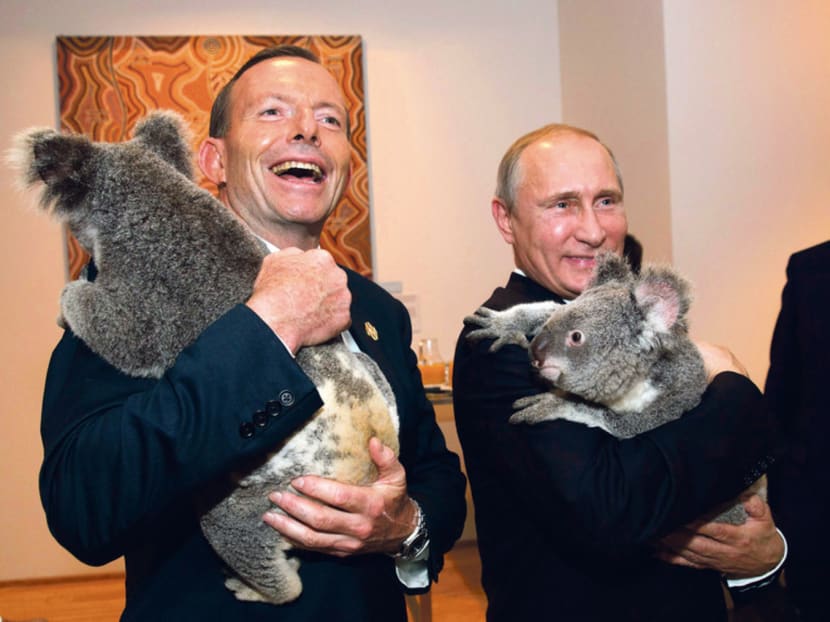Putin berated at summit, but unrepentant
BRISBANE — President Vladimir Putin weathered a barrage of criticism from world leaders at a summit in Australia, repeatedly facing them down with the same line — Russian troops are not operating in Ukraine.

While Mr Abbott (left) accused Mr Putin of ‘trying to recreate the lost glories of tsarism or the old Soviet Union’, he posed next to Mr Putin as they cuddled koalas. Photo: Reuters
BRISBANE — President Vladimir Putin weathered a barrage of criticism from world leaders at a summit in Australia, repeatedly facing them down with the same line — Russian troops are not operating in Ukraine.
Leaving the Group of Twenty (G20) summit in Brisbane early to get some sleep on the flight home before meetings today, Mr Putin was unrepentant in his mantra that it is the leadership in Ukraine’s capital Kiev that needs talking to.
He departed Australia shortly before United States President Barack Obama and European leaders opened their talks on the situation in eastern Ukraine, where they say Russia is backing separatist rebels after annexing Crimea in March.
In a briefing before he left for the airport, Mr Putin said he was pleased with the summit’s atmosphere and felt G20 leaders better understood one another.
Canadian Prime Minister Stephen Harper told Mr Putin: “I guess I’ll shake your hand, but I have only one thing to say to you: You need to get out of Ukraine.” After that, Mr Putin’s spokesman, Mr Dmitry Peskov, said the conversation had been within the bounds of decency.
While European leaders berated Mr Putin for the crisis in Ukraine, they also held a series of bilateral meetings with him to seek a way forward and avoid further sanctions.
The meetings reflect the dilemma facing heads of state in dealing with Mr Putin; while he was seated at the far end of the room in talks on the opening day and ate lunch at a table away from the likes of Mr Obama, leaders could not afford to shun him completely.
“Russia is geopolitically important — not only with regard to Europe and the West, but to Eurasia and the Pacific,” said Dr Rosita Dellios, an associate professor of international relations at Bond University on Australia’s Gold Coast.
Mr Obama, European leaders including British Prime Minister David Cameron and G20 host Australian Prime Minister Tony Abbott all assailed Mr Putin during the weekend meetings, although Mr Abbott’s actions showed the fine line leaders walked. While he accused Mr Putin of “trying to recreate the lost glories of tsarism or the old Soviet Union”, Mr Abbott posed next to Mr Putin as they cuddled koalas.
“When all is said and done, President Putin was a guest in our country,” Mr Abbott told reporters on Saturday.
Mr Obama yesterday bluntly accused Mr Putin of not living up to the ceasefire agreement, but offered no new plans for how the West might change the Russian leader’s calculus.
On the potential for increasing sanctions against Russia, Mr Obama said the US and European allies are always looking at more penalties, but the existing sanctions are “biting plenty good”.
“It is not our preference to see Russia isolated the way it is,” Mr Obama told reporters yesterday. “We would prefer a Russia that is fully integrated with the global economy.”
“But we are also very firm on the need to uphold core international principles ... you don’t invade other countries or finance proxies and support them in ways that break up a country that has mechanisms for democratic elections.”
Before leaving the G20 summit, Mr Putin said a solution to the Ukraine crisis was possible, but did not elaborate. “Today the situation (in Ukraine) in my view has good chances for resolution, no matter how strange it may sound,” Mr Putin said. AGENCIES









